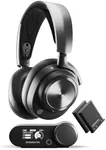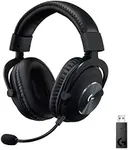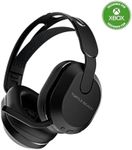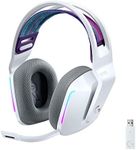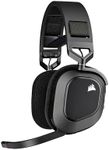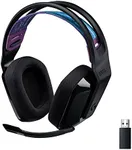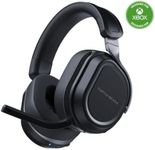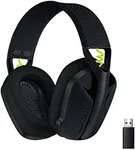Buying Guide for the Best Wireless Gaming Headsets
Choosing a wireless gaming headset can make a big difference in your gaming experience, offering freedom of movement and immersive sound. When shopping for one, it's important to think about how you'll use it—whether for competitive gaming, casual play, or even listening to music and chatting with friends. Understanding the key features will help you find a headset that matches your needs and ensures comfort, good sound quality, and reliable wireless performance.Wireless TechnologyWireless technology refers to how the headset connects to your device without cables, usually through Bluetooth or a dedicated wireless dongle (often using 2.4GHz radio frequency). This is important because it affects the connection stability, range, and potential audio delay. Bluetooth is more universal and works with many devices, but can sometimes have more lag, which might not be ideal for fast-paced gaming. Dedicated wireless dongles usually offer lower latency and a more stable connection, but may only work with certain devices. If you play competitive games or want the best audio sync, look for headsets with a dedicated wireless connection. For more casual use or if you want to use the headset with phones and tablets, Bluetooth might be more convenient.
Battery LifeBattery life tells you how long the headset can be used before needing a recharge. This is important because longer battery life means fewer interruptions during gaming sessions. Headsets can range from around 10 hours to over 30 hours on a single charge. If you often play for long periods or forget to charge your devices, look for a headset with longer battery life. If you only play in short bursts or don't mind charging frequently, a shorter battery life may be acceptable.
Sound QualitySound quality covers how clear, rich, and immersive the audio is. This is crucial for hearing in-game details, like footsteps or environmental sounds, and for enjoying music or movies. Headsets can have stereo sound or surround sound (virtual or true). Stereo is good for general use, while surround sound can help with positional awareness in games. If you play competitive shooters or want the most immersive experience, look for headsets with surround sound features. For casual gaming or general media use, stereo sound may be enough.
Microphone QualityMicrophone quality affects how clearly your voice is transmitted to teammates or friends. A good microphone reduces background noise and makes your voice sound natural. Some headsets have detachable or flip-to-mute microphones, which can be convenient. If you communicate a lot during games or use your headset for calls, prioritize a headset with a high-quality, noise-cancelling microphone. If you rarely use voice chat, this may be less important.
Comfort and FitComfort and fit refer to how the headset feels during long gaming sessions. This depends on the weight, padding, headband design, and ear cup size. A comfortable headset prevents headaches and ear fatigue. If you game for hours at a time, look for lightweight headsets with soft, breathable padding and adjustable headbands. If you only play occasionally, comfort may be less of a concern, but it's still worth considering.
CompatibilityCompatibility means which devices the headset can connect to, such as PC, consoles, or mobile devices. Some headsets are designed for specific platforms, while others are more universal. Make sure the headset you choose works with your main gaming device. If you use multiple platforms, look for a headset that supports all of them to avoid needing separate headsets.
Controls and FeaturesControls and features include things like on-ear volume dials, mute buttons, customizable sound profiles, and RGB lighting. These can make the headset easier and more enjoyable to use. If you like to adjust settings on the fly or want extra features like customizable sound, look for headsets with these options. If you prefer simplicity, a basic headset without extra features may be better.
